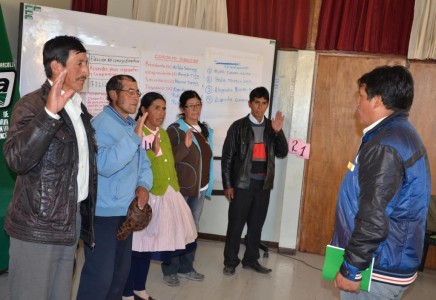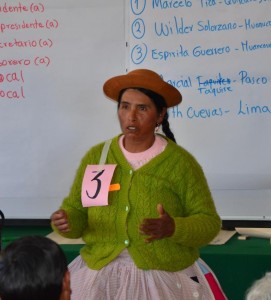Indigenous farmers from dozens of highland communities who recently met near the city of Huancayo founded the Asociación de Guardianes de Papa Nativa del Centro de Perú (AGUAPAN), or Native Potato Guardians’ Association of Central Peru, which will contribute to the economic and social well-being of the region’s smallholders while strengthening their conservation of potato diversity.
“The families of small-scale farmers in the places of origin of crops play a special role in their conservation and evolution, especially those custodian families who maintain exceptionally rich collections of native varieties,” explains Stef de Haan, leader of the Genetic Resource Program at the International Potato Center (CIP), one of the organizations supporting the initiative. “This is acknowledged in international treaties under the concept of ‘benefit sharing’, which proposes that these families and communities be recognized and compensated for the work they are doing. However, in practice, there are few examples of implementation of this concept”.
AGUAPAN has 43 members, from the same number of communities in five potato-growing departments of central Peru. The initiative is supported by the Dutch company HZPC, as part of its corporate social responsibility policy, Peru’s National Institute of Agricultural Innovation (INIA), the Peruvian Society of Environmental Law (SPDA), the Peruvian nonprofit grupo Yanapai, and CIP.

Various criteria were used to select the men and women participating in AGUAPAN. They are individuals who are recognized by their community and/or an institution as custodians of native potato diversity; they maintain at least 50 cultivars; they need support; they neither belong to the same community nor are directly related to another candidate; and the ratio of men and women promotes gender equity.
The 43 farmers held their first meeting at INIA’s Santa Ana Station, outside Huancayo, on July 10. After formally constituting and naming the association, they worked in groups to reach decisions regarding legal aspects, the initial investment and perceived benefits.
The benefits the farmers want include technological assistance to improve their production (seeds, fertilizer, pest and disease control, and assistance in dealing with adverse climate factors), and recognition of the role of custodians and of native potatoes as part of Peru’s national heritage. They also agreed on the need for access to more arable land; economic support such as loans, subsidies and grants; better education of the children in farming communities, and better healthcare and nutritional support for families.
The farmers decided that custodian families should receive cash in order to decide what the most effective investments are, though the funds should be used in activities relating to the conservation of native potatoes and/or for improving the families’ health, education and well-being. Each family would have to justify their investments to the association’s board, which will be elected during AGUAPAN’s next meeting.
One member, Juana Segama, from Allato, Huancavelica, says that the greatest challenge for her is to find a market for her potatoes. “I grow native potatoes as my mother did before me, and my grandfather before her,” she explains. “I have 214 varieties, but I always have excess seed. I hope that the association will help me – and others – to sell them in Huancayo, and perhaps in Lima. Transportation to the city has always been a problem,” she adds.

Espirita Guerrero, from San José de Aymara, Huancavelica, says she needs contacts to be able to take her native potato harvest to other markets. She grows some 180 varieties in her chacra (field). “In my house, potatoes are the main dish on our table,” says Guerrero, who is now the treasurer of AGUAPAN. “My family is very proud of me for taking part in this initiative. I hope that we can make progress on the topic of markets at the next meeting of the association, which will be in September. The association is going to help us to conserve our potato varieties, so that they are not lost.”
The concept of benefit sharing appears, in particular, in the International Treaty on Plant Resources for Food and Agriculture. More information at: http://www.planttreaty.org/es/content/derechos-de-los-agricultores
